Friends of South East Europe
The Friends of South East Europe (SEE) is an informal group of representatives from the OECD Member States that have a special interest in - or relations with South East Europe. It convenes regularly to provide an update on the OECD SEE Regional Programme’s activities and planned work, to discuss its strategic priorities as well as to explore closer co-ordination with OECD Member States. The group is currently chaired by Ambassador George Pagoulatos of the Permanent Delegation of Greece to the OECD.
Spring 2024 Meeting
The first Friends of SEE meeting of 2024 took place on 28 May 2024, marking the inaugural session led by the new chair, Ambassador Pagoulatos. He detailed key recent political and economic developments in the Western Balkans. Underlining the positive but sluggish pace of progress, he emphasised the OECD’s role in identifying obstacles and finding relevant policy solutions in the region. He was joined by Mr. Ulrik Vestergaard Knudsen, OECD Deputy Secretary General and Mr. Karim Dahou, Deputy Director of the OECD Global Relations and Co-operation Directorate and Head of the China Unit, who all delivered opening remarks.
The meeting focused on the OECD SEE Regional Programme’s latest work on enhancing economic competitiveness and convergence in the Western Balkans. In this context, the OECD team summarised the key findings of the fourth edition of the Western Balkans Competitiveness Outlook 2024. Although the region has made substantial progress in areas such as digitalisation and improving the labour market and fostering a conducive environment to boost trade and foreign direct investment volumes, persistent challenges remain. Special focus was given to the need to foster a level playing field for businesses, strengthening skills development and ensuring the sustainability of economic growth.
The report, along with the novel Data Hub, will be officially launched at the High-Level Conference on South East Europe, scheduled for 26 June. The Conference aims to explore policies to boost competitiveness and accelerate the region’s socio-economic convergence with the EU and OECD in pursuit of more resilient, prosperous societies. Two Ministerial Panels will allow policy makers from OECD and EU member states, South East Europe economies, as well as international and regional organisations to discuss critical priorities and collaborate on overcoming current and future challenges facing the Western Balkan economies.
During the tour de table, participants emphasised the crucial role of promoting socio-economic development to drive growth in the Western Balkans. Mr. José Roman Leon Lora, Counsellor with the Delegation of the European Commission to the OECD and UNESCO provided an update on the progress of Western Balkan economies on their EU accession path. He expressed his appreciation for the strong partnership between the EU and OECD, acknowledging the value of the OECD’s work in reinforcing EU initiatives.
Participants then highlighted the importance of the Competitiveness Outlook’s findings, which guide the development and implementation of economic reform agendas by the Western Balkan administrations but also identify areas where OECD member states can provide valuable knowledge, financial, and technical assistance. Additionally, many participants underscored the High-Level Conference’s relevance to further facilitating the Western Balkans' closer integration with both the EU and OECD.
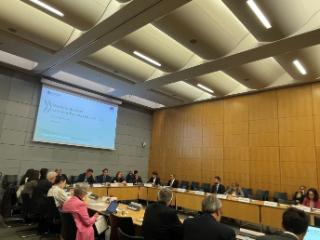 |
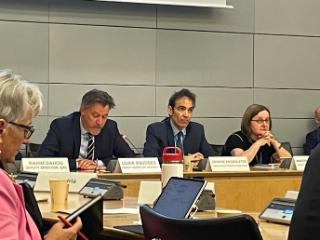 |
Further information:
Fall 2023 Meeting
The second Friends of SEE meeting of 2023 was held on 15 November 2023. Ambassador Turóczy, along with Mr. Ulrik Vestergaard Knudsen, OECD Deputy Secretary General and Mr. Andreas Schaal, Director of the OECD Global Relations and Co-operation Directorate & Sherpa for the G7, G20 and APEC, jointly delivered introductory remarks. The meeting centred around Croatia’s engagement with the Western Balkans and its co-operation with the OECD SEE Regional Programme in support of the Western Balkans’ economic competitiveness.
H.E. Gordan Grlić-Radman, Minister of Foreign and European Affairs of Croatia, delivered a keynote speech, underscoring Croatia’s strong support to the Western Balkans’ EU integration and accession. He detailed Croatia’s longstanding engagement in the region, stressing its multi-faceted approach to supporting socio-economic development through infrastructure, health, education, and culture. He highlighted specific initiatives, such as strengthening democratic culture in Bosnia and Herzegovina or bolstering regional investment through contributions to the Western Balkans Investment Framework. He added that this engagement would be further expanded through the new OECD-Croatia project, which will aim to support the Western Balkan economies in facilitating the green and digital transition.
The participants reasserted their continued commitment to supporting the Western Balkans’ path toward getting closer to EU and OECD policies and standards. They all acknowledged the impactful work done by the OECD SEE Regional Programme in informing and supporting the region's economic reform agenda. As such, they expressed their satisfaction with the deepening partnership between Croatia and the OECD SEE Regional Programme.
At the end of the meeting, the OECD SEE Regional Programme briefly provided an update on its main activities since the last Friends of SEE meeting, most notably its involvement in this year’s Western Balkan Berlin Process. To backstop the discussions at the Berlin Process Leaders’ Summit 2023, the Programme specifically prepared the Western Balkans Economic Convergence Scoreboard 2023. Designed to assist policymakers in the Western Balkans with identifying reform priorities, the Scoreboard shows the convergence of the Western Balkan economies towards EU policy outcomes and OECD standards across five priority policy clusters.
The meeting was followed by the signing ceremony between Ambassador Grlić-Radman and OECD Secretary-General Mathias Cormann to launch the three-year project between Croatia and the OECD SEE Regional Programme. The project will seek to support the Western Balkans in implementing Competitiveness Outlook and SME Policy Index recommendations to accelerate businesses’ digitalisation and greening through regional dialogue, capacity building, and the provision of business support services.
Further information:
Spring 2023 Meeting
The spring 2023 Friends of SEE meeting was held on 20 June 2023. Introductory remarks were delivered by Ambassador Turóczy as well as Ambassador Régine Vandriessche, Chair of the OECD External Relations Committee (ERC) and Permanent Representative of Belgium to the OECD, and Mr. Andreas Schaal. The thematic focus of this meeting was the green transition in the Western Balkans and how this transition can promote sustainable, long-term economic development in the region.
Against the backdrop of this emphasis on the green transition, the OECD SEE Regional Programme presented its recent and upcoming work. An overview of the ongoing fourth cycle of Competitiveness Outlook was shared, highlighting the publication’s focus on the cross-cutting themes of the green and digital transition. Moreover, the team introduced the development of the new digital data platform, which aims to bolster the accessibility and visibility of the main findings. The Programme then detailed its work stream on circular economy, including the development of circular economy roadmaps and the establishment of the Regional Circular Economy Peer Dialogue to support the implementation of these roadmaps. The OECD Development Centre then introduced its new project on facilitating the just green energy transition in the region.
Participants from OECD member states and accession countries reaffirmed the geopolitical significance of the Western Balkans. They recognised economic prosperity and EU accession as key tools that contribute to political stability and continued commitment to the reform process. They concluded by confirming that the green transition, as well as other policy areas such as labour market challenges and anti-corruption, will serve as key priorities guiding their engagement with the Western Balkan economies.
 |
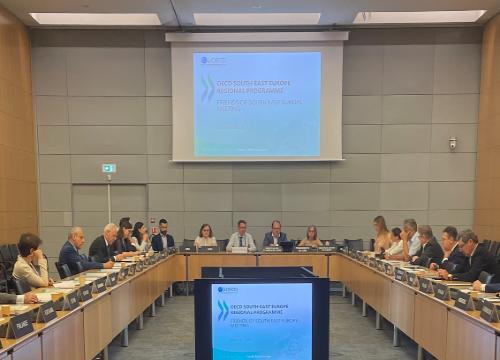 |
Further information:
Fall 2022 Meeting
The second Friends of SEE meeting of the year was held on November 30th. Opened jointly by Ambassador Turóczy, Permanent Delegation of Hungary to the OECD and UNESCO and Mr. Andreas Schaal, Director of the Global Relations and Co-operation Directorate, the meeting was attended by more than 40 participants from OECD member states and accession countries, the European Commission and the OECD Global Relations and Cooperation Directorate.
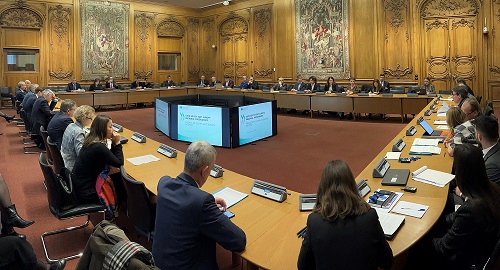 |
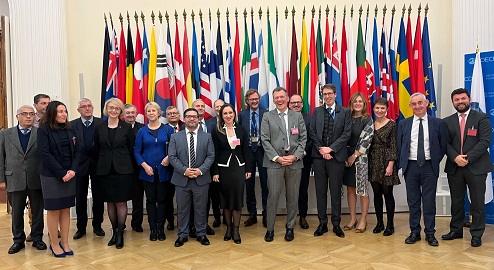 |
Mr. Mathieu Bousquet, Acting Director at the Directorate General for Neighbourhood and Enlargement, European Commission joined the meeting as guest speaker. He updated the participants on the Western Balkans’ EU integration and the joint EU-OECD support to their economic policy. He underlined that enlargement was back on the EU agenda, citing the beginning of accession negotiations with Albania and North Macedonia and the Commission’s recommendation to grant EU candidate status to Bosnia and Herzegovina. He added that evidence-based policy guidance by the OECD would be beneficial and needed for the region’s economies during the accession process.
The OECD team then presented the Programme’s recent achievements and upcoming work. The start of the new assessment cycle of the Competitiveness Outlook was announced, as well as the new work stream on the design and implementation of circular economy roadmaps for the Western Balkans. The team also provided a brief overview of the economic impact of the Russian aggression against Ukraine in SEE. Finally, the key findings of the Programme’s recent flagship report SME Policy Index 2022: Western Balkans and Turkey were shared with the participants.
The participants underscored the OECD SEE Regional Programme’s remarkable success and impact in bringing the region’s economies closer to OECD standards and helping them integrate with the EU. They expressed their contentment on the Programme’s growing focus and scaled-up activities on facilitating the green and digital transition in SEE.
The meeting was followed by the signing ceremony of the EU grant to launch a four-year project with the OECD. Building on the longstanding OECD-EU co-operation, the OECD will extend its support to align policies in SEE with OECD, EU and international best practices, and to facilitate competitive, sustainable and inclusive economic growth.
Further information:
- Agenda
- Presentation
- OECD-EU joint project launch
- Event photos (via Flickr)
Spring 2022 Meeting
The first Friends of SEE meeting of 2022, chaired by Ambassador László Turóczy of the Permanent Delegation of Hungary to the OECD and UNESCO, was held on April 20th. It was the first in-person meeting since the onset of the COVID-19 pandemic. More than 50 participants from 28 OECD member states, the European Commission and the OECD Global Relations and Co-operation Directorate were present.
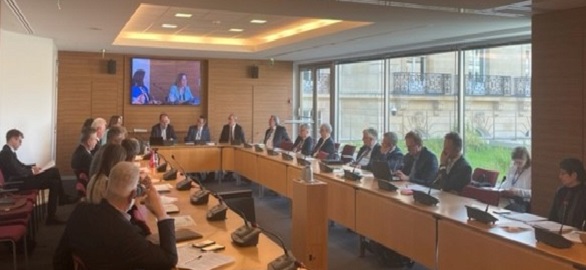
The meeting focused on the OECD SEE Regional Programme’s latest work on labour migration and the preparation of the High-Level Conference on SEE held in May 2022. The OECD team highlighted that the Western Balkans have been suffering from chronically high levels of emigration and brain drain. About one-fifth of the population born in the Western Balkans lives abroad, and one-third of people living in the region consider emigration. The key findings of the report Labour Migration in the Western Balkans were then summarised, outlining the key recommendations on maximising development benefits from emigration and on alleviating its causes.
Mr. Francisco Gaztelu Mezquiriz, Head of Unit for Migration Assistance to Neighbouring Countries, DG NEAR, European Commission, joined the meeting as special guest. He shared the EU’s approach towards migration policies as well as its support to the Western Balkans. He stated that the EU has so far invested around EUR 500 million in improving migration management in the Western Balkans and plans to have new initiatives, focusing on knowledge transfer and unlocking the diasporas’ potential across the region.
The participants discussed that reducing brain drain and leveraging diasporas for socio-economic development are important policy priorities for the region. OECD member states would be well-placed to share their own experiences and good practices, as many of them have grappled with large emigration in the past.
Further information:
Meetings in 2021
Fall 2021 (virtual)
Spring 2021 (virtual)
Related Documents

